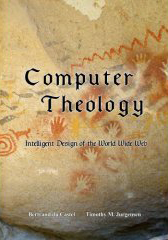PRESS
COMPUTER THEOLOGY |
||||
|
back; or, perhaps the sharp pain of a predator’s claw to the
throat. In a world devoid of mechanical aids, all that we know is what our
senses tell us of that world close by. The complementary facilities to our senses are the motor mechanisms
through which we initiate and sustain interactions ourselves. These are
comprised of the skeleton supported muscle systems that allow us to push and
shove, to walk and run, to jump, to grasp, to rip apart flesh with our teeth;
the list is limited pretty much by the lengths or heights that we are driven to
in any particular instance by our overarching needs. Our ability to extend our
actions or the effect of our actions, beyond the limits of our immediate reach,
rests with our motor abilities to impact our physical environment. Our vocal
system allows us to make directed sounds that project our presence for some
moderate distance; we can shout a warning or a plea for help. We know that our
scent betrays us to many predators or prey, so we approach the deer from down
wind. These two sets of facilities together form our sensori-motor system; the
means through which we interact with our physical ecosystem. Impetus of Interactions
Through our sensori-motor system, we learn about threats and we react to
those threats. If our ability to react to threats were strictly limited to our
innate, physical abilities then we might be in some serious trouble as a
species. There are a lot of big predators that are stronger and better equipped
at hand-to-hand combat than are we. As one crocodile, laying contentedly sated
on the sunny riverbank, surrounded by a pith helmet and other accouterments of
an explorer on safari, is seen commenting to another crocodile in a Far Side
cartoon, “That was great! Just warm and pink; no horns, or scales, or fur, or
claws, or teeth!” So, at least some of our dominance as a species has derived
from an ability to shape the ecosystem to our advantage; to shelter ourselves
from the heat and cold, to cloth our bodies from the ice and snow; and to
create tools to magnify our abilities to protect ourselves and to extract food
from other species. The ability to accomplish these ends quite successfully has
allowed humans to rise to dominance. Collectively, we have little to fear from
our natural predators, although an errant camper still gets attacked by a bear
from time to time and swimmers have unsuccessful encounters with sharks with
some regularity. Rather, it is microbes at one extreme and cataclysmic physical
force at the other that remain perhaps the most serious threats to our
existence. These are things that interact at the very boundaries of our
understanding and ability to manipulate our environments. Collectively, we’re
still all situated in too small a volume of space to get too smug about our
long-term survival chances. So, we might consider, is there some guide or impetus to human activities that bridges the expanse from physical ecosystem to social ecosystem? If, as appears to be the case, the acquisition of food and physical sustenance is only part of what drives the individual human, then what other stimuli might there be to drive people to interact? As it happens, Abraham Maslow suggested in Toward a Psychology of Being just such drivers in the form of a set of behavioral stimuli that he presented as a hierarchy of human needs. He proposed that people are motivated by a collection of physical and social stimuli that are hierarchically related; that is, if a lower level stimulus is satisfied then a higher-level stimulus may come to the fore. If a lower level need is not satisfied, then it may overwhelm a correspondingly strong need at a higher level of the hierarchy. We will conceive of the hierarchy as layers in which each subsequent need is stacked on the previous one as follows: |
||||
|
||||
© Midori Press, LLC, 2008. All rights reserved for all countries. (Inquiries) The contents of ComputerTheology: Intelligent Design of the World Wide Web are presented for the sole purpose of on-line reading to allow the reader to determine whether to purchase the book. Reproduction and other derivative works are expressly forbidden without the written consent of Midori Press. Legal deposit with the US Library of Congress 1-33735636, 2007.
|
ComputerTheology Intelligent Design of the World Wide Web Bertrand du Castel and Timothy M. Jurgensen Midori Press, Austin Texas 1st Edition 2008 (468 pp) ISBN 0-9801821-1-5 |
Book available at Midori Press (regular) |
